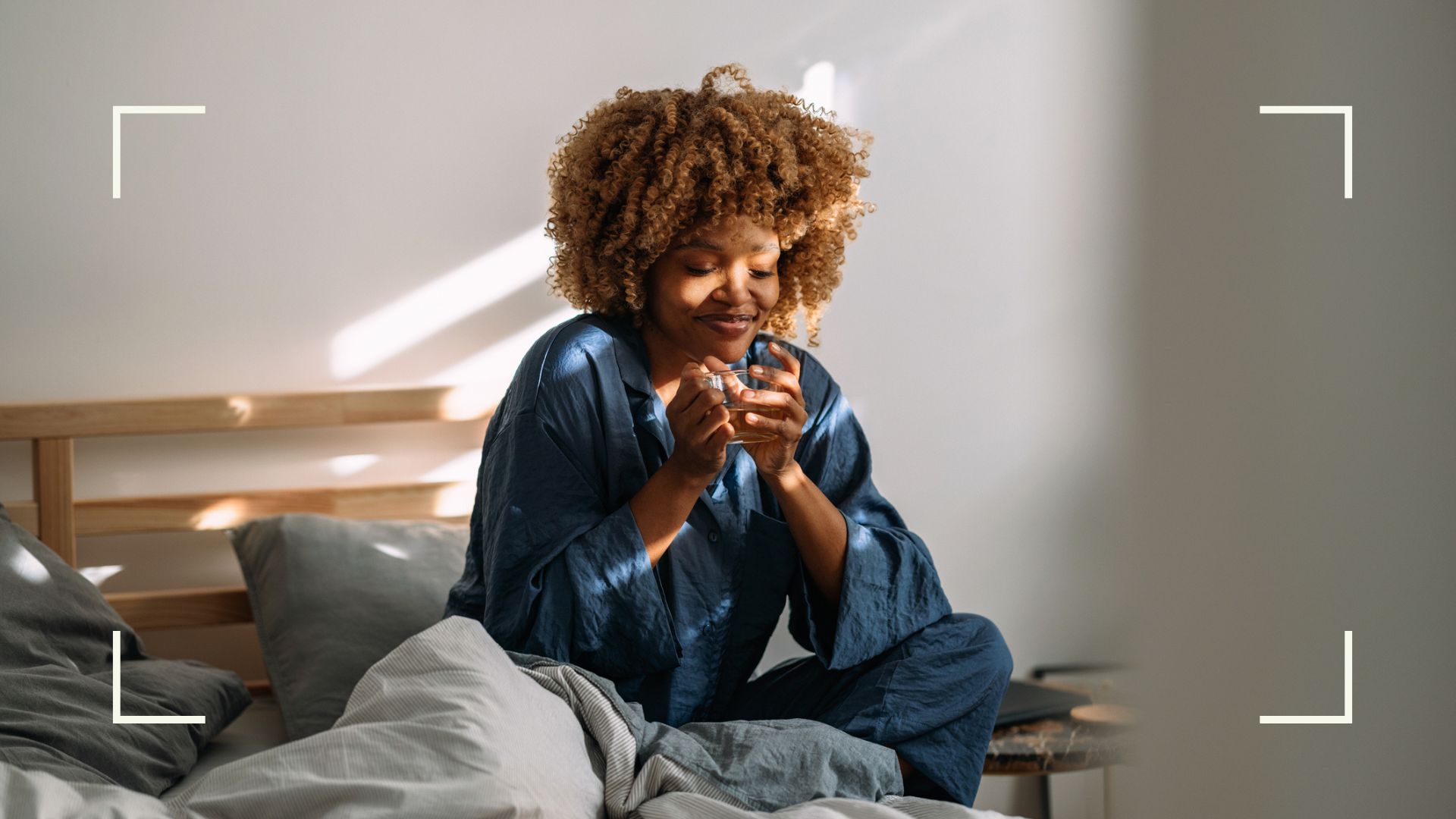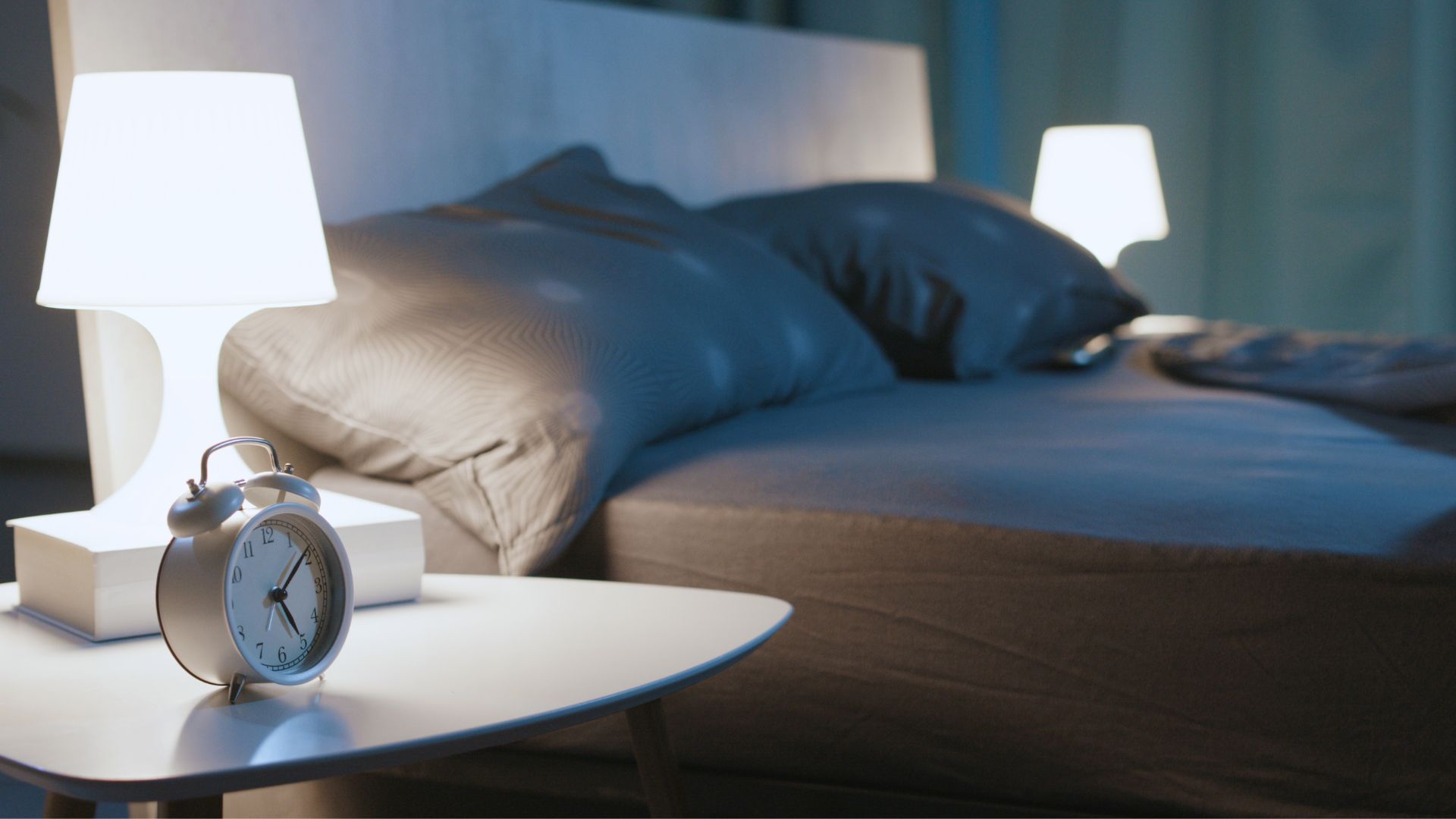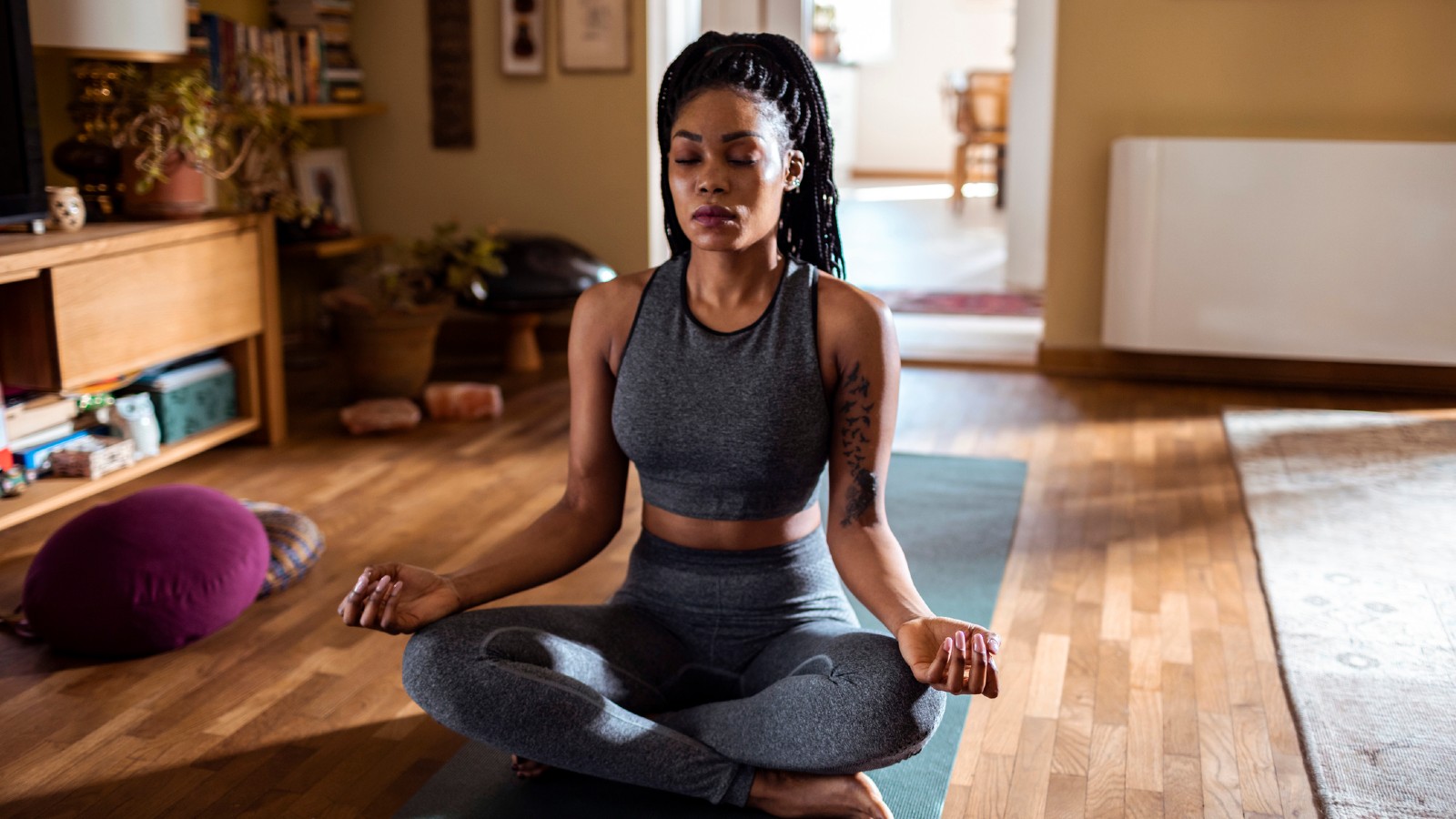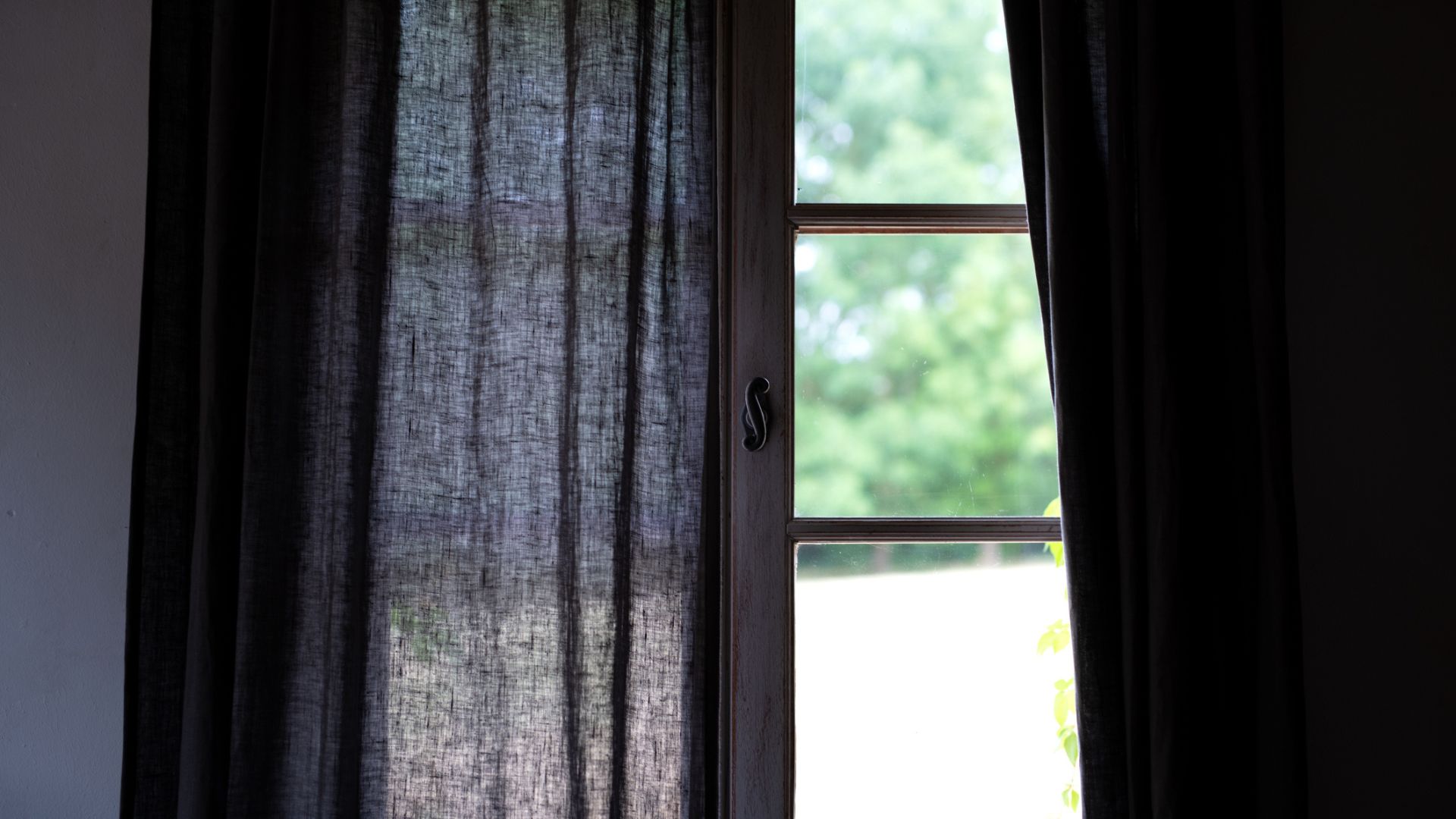What is sleep hygiene and why is it so important for a great night’s sleep?
Better sleep hygiene may help you to drift off a little easier at night


Sleep hygiene is all about improving the environment you sleep in, both mentally and physically, to allow you to get to sleep easier. It includes making sure you've got the right setup in your bedroom, limiting distractions, and creating a good daily routine to help you get in the mood for sleep.
Often, we know what it takes (in theory) to sleep better but putting it into practice can be a little harder. When we hear the word 'sleep schedule', it's sometimes not clear exactly what that means. Equally, improving your 'sleep environment'. Beyond having comfortable bedding, what does this mean?
If you're looking to learn how to sleep better, improving your sleep hygiene could be the answer. So here, with the help of several sleep experts - including a nutritionist and scientist - we reveal what it really means to do this and why it's important.
What is sleep hygiene?
Sleep hygiene is a set of rules that outlines how we can sleep better at night and it's made up of several contributing lifestyle and environmental factors, says physiologist and sleep specialist Dr Nerina Ramlakhan. "It includes instructions for a good daily and nightly routine, a comfortable bedroom environment, a sleep schedule, bed comfort, and the ability to switch off and relax when our head hits the pillow at night."
The phrase was first coined and these rules were recommended by Peter Hauri in 1977 in his book The Sleep Disorders. Providing that you can harness these factors, research from the likes of North Dakota University and Qazvin University of Medical Sciences suggests that you'll be able to sleep uninterrupted at night. However, as newer research by the University of Sydney points out, it's often a lot more complex than this. The study says that current practices don't consider important factors that can affect sleep, such as emotional stress, daytime exposure to light, and how hard it can be to change our habits.
Other research in recent years has also made space for advancements in technology, such as the problems linked with mobile phones and blue light at night. Overall, the studies agree that sleep hygiene recommendations need to be more individualized because we all react to a loss of sleep differently and so will need slightly different sleep hygiene rituals.

Why is sleep hygiene important?
Lacking sleep hygiene simply means you'll struggle to fall asleep fast and stay asleep at night, as the idea behind the concept is to make the perfect routine and environment for you to sleep in. It's the potential for a lack of sleep that makes sleep hygiene so important, as Dr Ramlakhan, who is also the resident sleep expert for Silent Night explains. "Poor sleep hygiene can result in exhaustion, which can limit our concentration span, creativity, and overall thinking capacity," she says. Below, she highlights some of the other key side effects of poor sleep hygiene and sleep deprivation.
Sign up to our free daily email for the latest royal and entertainment news, interesting opinion, expert advice on styling and beauty trends, and no-nonsense guides to the health and wellness questions you want answered.
- Weakened immunity: "Sleep and rest are required to strengthen the immune system, which helps us fight off all kinds of infections. If sleeping becomes irregular, the immune system weakens and makes us more vulnerable to illness and infection."
- Negative mood: "Prolonged sleeping difficulties can result in irritability and tetchiness, as well as more long-term mental health problems, such as anxiety and depression."
- Weight gain: While weight gain can be attributed to numerous causes, a lack of sleep does play with our appetite, spiking our hunger hormones. "This can often result in overindulgence, even after eating a full meal," she explains.
- Physical health issues: A lack of sleep can cause issues for us physically as sleep is pretty essential for growth and repair in the body. Dr Ramlakhan says common physical side effects include "issues such as eczema, psoriasis, headaches, migraines, and hormonal and menstrual irregularities."
How to improve your sleep hygiene
1. Develop a sleep schedule
"One of the best things you can do to help you to get your circadian rhythm back in sync and feel fully refreshed during the day is to establish a set sleep schedule," says Rob Hobson, a nutritionist and sleep specialist. "This means going to bed at the same time every night and waking up the same time each morning."
The best time to sleep and wake up will be personal to you, as will how long you should sleep, depending on what you feel your body needs. "You can follow the natural flow of your circadian rhythm by going to bed at around 9 or 10 pm," says Hobson, who is also the author of The Art of Sleeping and the lead nutritionist at Healthspan. "This is when your body naturally releases the sleep hormone melatonin. This secretion stops naturally at around 7 am."
Another method to develop a good sleep schedule is to work within the sleep stages, all of which are needed for a beneficial night's sleep. "It's thought that you will feel more fully refreshed if you wake at the end of a full cycle of the stages," he offers. "If you want to work in cycles, you can calculate the number of hours to sleep accordingly. If you want to get five full cycles then that would mean getting 7.5 hours of sleep."
Also, he adds, don't be afraid to lean into your natural sleeping behaviors if you're looking to learn how to sleep better. "If you're a night owl, you'll naturally feel sleepy much later in the night than a morning lark, as the names go, so you may need to adopt a way of life that allows you to wake up later in the morning. This could mean scheduling work later in the day or moving work hours around to start and finish later."

2. Create a bedtime routine
While elaborate multi-step routines and nighttime rituals may not be something many of us have time for, it's worth incorporating some kind of routine into your evening to make sure your brain is in the mood for sleep. As the new research by the University of Sydney points out, it's important to wind down after the day and deal with any emotional stress before bed.
"Most people flop into bed after a busy day without giving their brains or body a chance to unwind," warns Dr Neil Stanley, the former head of sleep research at the University of Surrey. "Quite simply, they've forgotten how to relax."
Dr Stanley recommends creating a 30-minute wind-down bedtime routine to program your brain into recognizing that sleep's on the horizon. Much like a Sunday reset, a bedtime routine should involve limited distractions and stimulating activity, which means putting your phone to one side and lowering the lights.
"Find something that relaxes you instead," the doctor suggests. "We're all unique, so different things work for different people." Here, he recommends some elements to incorporate into your bedtime routine:
- Have a warm bath: "It dilates blood vessels in your extremities and cools the body once you leave the tub, mimicking the natural drop in temperature your body needs to sleep," Dr Stanley tells us.
- Enjoy a hot milky drink: "Choose a bedtime drink, such as milk, that contains tryptophan, a natural sleep-promoting amino acid. Snacks, such as a banana or turkey sandwich contain it too, but you should avoid big meals late in the evening. You could also try relaxing with a variety of sleep teas."
- Practice yoga or meditate: "Try a breathing technique where you breathe through your nose, using your abdomen, not your chest. Breathe in for three seconds, then out for three. Pause for three seconds before breathing in again. Repeat for three minutes. You could also try some bedtime yoga to relax your body and mind or one of the best sleep apps."
- Write a to-do list: Feel your mind racing? Some manifestation before sleep could be the answer. "An hour before bed at least, write a to-do list that will help you put the day to one side and focus on relaxing."
- Exercise at least three hours before bed: Working out can do wonders for our sleep, but you should leave at least three hours between getting home from your workout and trying to go to sleep, says the doctor. "This will give your body temperature a chance to cool."
3. Put your phone to one side
Our phones and particular apps (looking at you TikTok) can help distract us from the stress of the day, we all know the eye-aching feeling of pulling ourselves away from a screen after too many hours spent scrolling.
Research by Colombia University outlines just how damaging blue light, i.e. the light our phones emit, can be for our sleep. The study found that exposure to this light may affect sleep by suppressing melatonin, which is the hormone we need to fall asleep, and causing neurophysiological arousal. Essentially, when we look at our phones, our brains think it's time to be awake - and it can be quite hard to convince them otherwise.
"Avoid looking at a screen in the evenings if possible," agrees Dr Stanley. "Swap an hour in front of the TV for a magazine or a book, as screens stimulate rather than calm the brain." And if you wake up in the middle of the night and want to get back to sleep, the same rules apply: opt for 10 minutes of reading rather than scrolling in the early hours.
4. Declutter your space
"Of all the things I talk about when it comes to sleep, the bedroom oasis is a game-changer and something many people do not pay enough attention to," says sleep specialist Hobson.
Mess causes stress, the saying goes, so make sure to tidy up your space every evening before getting into bed. If your bedroom is a workspace during the day, tidy up your desk and switch off any standby lights when you sign off. This will help turn your workspace into a sleep space.
5. Check your bedding
No one likes a lumpy mattress, but many of us put up with our bedding because investing in a new mattress and pillows can be an expensive endeavor. If you're able to though, it could help you sleep better.
"If your mattress is more than seven to 10 years old then think about replacing it," says Hobson. "It could be causing you joint pain and poor sleep. A new mattress may be the solution. This is a big investment, so take your time to decide on what works best for you and shop around."
Your pillows should be supportive and comfortable as well, but not too soft or too hard. Investing in the best pillows for neck pain could be particularly beneficial for those dealing with back and neck problems. Choose hypoallergenic bedding as "they are made of natural fibers, usually cotton, and not only do they ward off bugs that cause allergies but also help to maintain body temperature during the night," says the sleep specialist.
If you're not able to change your mattress or pillows, it may be worth learning how to clean a mattress to give it a new lease on life.

6. Keep the room cool
It feels nice to be cozy and warm in bed but keeping the room a little cooler has been shown to help us fall asleep fast. Most doctors and research studies, including that of the University of Basel suggest keeping your bedroom thermostat at 60 to 67 degrees Fahrenheit (15.6 to 19.4 degrees Celsius) where possible.
If it's the summer and you're struggling with how to sleep in the heat, there are a couple of things you can do, such as applying a wet flannel to your extremities, keeping your hands and feet out of the covers, and opening the windows.
7. Keep your room dark
As mentioned, light plays a huge role in how well we can get to (and fall) asleep. It's not just artificial light that's an issue though. Sunlight plays a key role in regulating our circadian rhythm, a body clock that essentially tells us when to sleep.
Studies by Brigham and Women's Hospital and Harvard Medical School found that participants who were exposed to light during the hours they'd normally be asleep had a later onset of melatonin (up to 99%) and less melatonin production throughout the night, meaning they found it significantly harder to fall asleep.
"Try blackout curtains or blinds, particularly in the summer when sunlight streaming into your bedroom in the early hours can disrupt your sleep," says Hobson. "If possible, wear light, cotton nightwear to keep you cool."
8. Exercise outside during the day
Also noted in the newer research by the University of Sydney is the need for daytime exposure to light. While it's something to avoid at night, this is something we need in the morning to keep our circadian rhythm on track.
Dr Stanley says, "Light in the morning will inhibit the production of melatonin, signaling that it's time to wake up, and keeping our energy levels up in the morning. One way to make sure you get plenty of this is to start your day with a walk. Whether it's walking meditation or more of a speed walk that's up to you, but the combination of exercise and daylight first thing in the morning is proven to set us up best for the day and help us sleep at night. Research conducted on nearly 400 women by the Queensland University of Technology found a significant link between physical exercise and time spent outdoors and the length of time they were able to sleep for.
9. Practice some self-care
Looking after yourself and implementing some self-care into your nighttime routine is important too. It's supposed to be a relaxing process after all. So, get that lovely scented candle burning before bed, and invest in a soothing bed linen spray, or another one of the best sleep aids and you may be able to fall asleep in three minutes or less.
If you're going to pick up a pillow mist or candle, Hobson has the following suggestion: "Try scents such as lavender, ylang-ylang, or lemon balm–in fact, just use a scent that means something to you and helps you to relax."

Grace Walsh is woman&home's Health Channel Editor, working across the areas of fitness, nutrition, sleep, mental health, relationships, and sex. She is also a qualified fitness instructor. In 2025, she will be taking on her third marathon in Brighton, completing her first ultra marathon, and qualifying as a certified personal trainer and nutrition coach.
A digital journalist with over seven years experience as a writer and editor for UK publications, Grace has covered (almost) everything in the world of health and wellbeing with bylines in Cosmopolitan, Red, The i Paper, GoodtoKnow, and more.